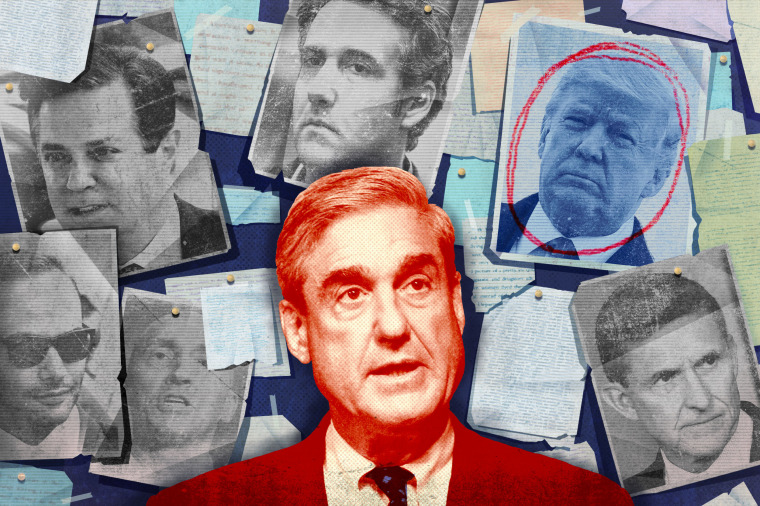WASHINGTON — In the weeks after Donald Trump became the Republican nominee in late July 2016, the FBI warned him that foreign adversaries, including Russia, would attempt to spy on and infiltrate his campaign.
It was a standard briefing, the kind routinely given to presidential candidates, capped with an admonition that Trump should call the FBI if he learned of any unusual approaches from foreigners.
But there was something the FBI didn't tell him.
The bureau just recently had opened counterintelligence investigations into four Trump advisers suspected of improper interactions with Russians — a fact, then-secret, that emerged much later in Congressional testimony.
Two of the four, Paul Manafort and Michael Flynn, were top Trump aides with Russian baggage. A third, George Papadopoulos, had been offered Hillary Clinton emails by a Russian agent. The fourth, Carter Page, had traveled to Russia while advising the Trump campaign.
Those FBI inquiries grew into what has become special counsel Robert Mueller's sprawling Russia investigation — a legal juggernaut that threatens to overwhelm Trump's presidency.
The Mueller probe has led to criminal charges against 33 people, including three of those original four, and engulfed the Trump administration in a legal and political morass unlike anything the country has witnessed since the impeachment of President Bill Clinton, and before that, Watergate.
But a central question remains unanswered, and it's one that could hold the key to what happens over the next few months: What did FBI officials know in the summer of 2016 that dissuaded them from telling Trump they were investigating his top aides?
The world may soon know the answer. Government officials and others familiar with the situation tell NBC News that Mueller is nearing the end stages of his investigation, and a report by the special counsel is expected to be submitted to the Justice Department as early as mid-February.
Appointed in May 2017, Mueller, a Republican, Vietnam combat veteran and career public servant who led the FBI after 9/11, assembled a team of veteran prosecutors. They called upon the fruits of secret U.S. intelligence gathering to lay bare, in two indictments, how Russian intelligence officers and agents used fake social media personas and illegal hacking to hurt Hillary Clinton and help Donald Trump.
When it comes to any American involvement in that Russian operation, much of what Mueller has learned remains a tantalizing secret.
Even so, the evidence that has surfaced so far — of crimes and lies and questionable judgment — is of a sort that might have crippled previous presidencies.
Court documents, emails and testimony have shown that the president's son was willing to accept incriminating information on Clinton from the Russian government; that the president didn't tell the truth about his dealings with Russia during the campaign; and, in a separate federal probe, that the president directed his lawyer to commit campaign finance crimes.
Three men who once sat in Trump's inner sanctum — Michael Cohen, Paul Manafort and Mike Flynn — have been convicted or pleaded guilty to serious crimes and have cooperated, to varying degrees, with the investigation.
A number of the assertions in the controversial Steele dossier on Trump, paid for by Democrats and compiled by a former British spy — though they are raw, uncorroborated and derided by Trump and his allies — have proven to be accurate, according to multiple analyses by former intelligence officers.
But.
And it's an important "but."
Mueller has so far not showed the public proof that speaks to the central question he was hired to answer: Whether Trump or any of his associates actively conspired with the effort by Russian intelligence officers to hack, leak and otherwise interfere in the 2016 election. None of the criminal charges filed to date have addressed that issue.
That stubborn fact, which could change any day or remain fixed for eternity, is what fuels Trump allies who echo the president's assertion that the investigation is illegitimate.
On Sunday, Trump lawyer Rudolph Giuliani challenged Mueller via Twitter to "put up or shut up. You have no evidence of the President being involved in a conspiracy with anyone including Russia ... And you also have no evidence of collusion."
It's a view that is repeated daily in conservative media and embraced by tens of millions of Americans who remain loyal to the president.
"Collusion just does not exist," said Victoria Toensing, a conservative lawyer who represented Trump aide Sam Clovis and other unnamed witnesses in the probe, and therefore has been in meetings with the Mueller team.
"All these little things about a meeting with a Russian here or there," Toensing told NBC News. "It doesn't add up to anything."
Toensing said she believes the investigation was concocted by a cabal of government insiders "who decided they had to save the country from Donald Trump."
Many legal experts have a sharply different view.
They argue that what Mueller has already established is damning, and hints at far more shocking revelations to come.
"We have yet to see the smoking gun, but we have a lot of smoke," said Frank Figliuzzi, who once hunted for Russian spies as head of the FBI's counterintelligence division and is now an NBC News analyst. "Would I expect Mueller to have shown his hand yet in all of this? Absolutely not."
Trump's Twitter campaign to discredit Mueller has harmed the prosecutor's image among a subset of Americans, polls show. But among the public at large, it does not appear to be working.
Fifty-four percent of Americans believe Mueller has conducted a "fair investigation," according to an NPR/PBS News Hour/Maris poll this month, while 33 percent call it a "witch hunt."
In an NBC News/Wall Street Journal poll released Dec. 16, 62 percent of Americans say Trump has been untruthful about the Russia probe, while half of the country says the investigation has given them doubts about Trump's presidency
The Mueller investigation has already exposed serious misconduct, according to NBC News analyst Chuck Rosenberg, a former federal prosecutor who once headed the Drug Enforcement Administration.
"The president is all but an unindicted co-conspirator in election law crimes and Russia seems to crop up in every aspect of the case, from internet troll farms to GRU hacking to Manafort's business dealings. And all the false statements by Papadopoulos, Cohen, Flynn — all those cases concern Russia," Rosenberg said.
Daniel Goldman, a former federal prosecutor in New York, said he is beginning to believe that conspiracy with Russian election interference is not the most serious crime Mueller is investigating.
Goldman, also now an NBC News analyst, postulates that at the heart of the inquiry is a question of whether the president has made foreign policy decisions — particularly with regard to Russia and Saudi Arabia — for personal financial reasons, rather than in the best interest of the country.
"What we are learning is that there may have been a much larger conspiracy to provide sanctions relief to Russia either in return for personal business and financial benefits or in return for assistance in the campaign," Goldman said.
That is why, Rosenberg, Goldman and other legal experts say, the Mueller team almost certainly has obtained many years of Trump's tax returns and business records, and is poring over past transactions, particularly his foreign ones.
So it has come to pass that Trump is the first president in 40 years to withhold his tax returns from the public, but also the first president to have them scrutinized, in all likelihood, by a team of IRS and FBI experts.
Meanwhile, the question of whether Trump obstructed justice — by asking FBI Director James Comey to drop the bureau's investigation into Flynn, firing him when he didn't and publicly denouncing the investigation on Twitter — remains another subject of Mueller's inquiries, as an FBI lawyer recently confirmed to Congress.
The beginning
It started — at least one strand of it — at a bar in London.
In May 2016, George Papadopoulos, a young political striver who had landed a spot advising the Trump campaign on foreign policy, sat down for drinks with a senior Australian diplomat.
As the diplomat, Alexander Downer, later recounted it, Papadopoulos told him he had been informed by a mysterious Maltese professor that the Russians had thousands of emails that could embarrass Trump's opponent, Democrat Hillary Clinton.
At the time, few people were aware that the Russians had hacked the Democrats.
Two months later, when Democratic emails began leaking, Downer's report about his conversation with Papadopoulos reached the FBI, according to documents later released by Congress.
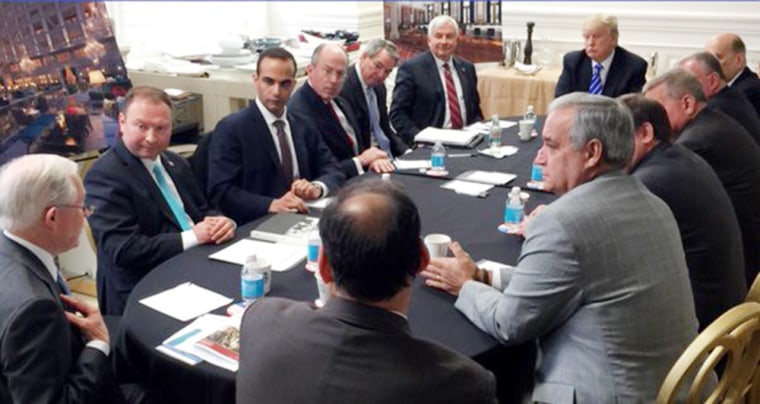
It was one of a number of troubling reports streaming into U.S. intelligence agencies that summer suggesting a covert Russian intelligence campaign to influence the upcoming U.S. election, current and former U.S. officials told NBC News.
Intelligence on what the Russians were up to was pouring in from allies, assets and electronic intercepts.
To their distress, FBI and CIA officials began to see indications that Americans might be helping.
John Brennan, who was the CIA director at the time, told Congress last year that he "encountered and am aware of information and intelligence that revealed contacts and interactions between Russian officials and U.S. persons involved in the Trump campaign."
He said he shared the CIA's intelligence with FBI Director Comey, who shared with him some things the FBI had learned.
On July 29, 2016, the bureau formally opened a counterintelligence investigation focusing on four people, according to congressional testimony by Comey.
U.S. officials told NBC News that the four people were Papadopoulos, Page, Manafort and Flynn.
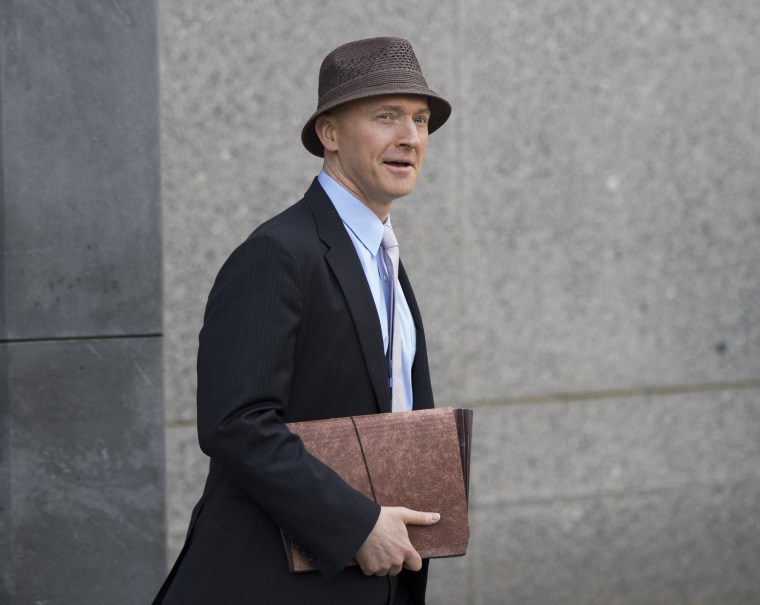
Page and Manafort had already been on the FBI's radar — Page because he had been previously targeted for recruitment by Russian intelligence; Manafort because of his consulting work for a Russian-backed Ukrainian politician.
It's not known exactly what got the FBI interested in Flynn, the former head of the Defense Intelligence Agency. One factor, officials said, was his decision to accept $45,000 to speak at the 10th anniversary gala of the Russian state media company RT in December 2015, where he dined with Russian President Vladimir Putin.
When the FBI briefed Trump on foreign spy threats after the Republican National Convention, it was decided that briefers would not mention that two of his top aides were under scrutiny, a former senior official told NBC News. The concern was that doing so could tip off the targets of the probe. Nobody knew what Trump would do.
"It really complicated matters tremendously given the nature of the individuals under investigation," the former official said.
Comey out, Mueller in
As one of his last acts in office, President Barack Obama expelled 35 Russian diplomats and seized two Russian-owned compounds in the U.S. in response to Russia's election interference. Most experts expected Putin to respond in kind.
To their surprise, he took no action.
On Jan. 12, 2017, a possible reason for that emerged. Washington Post columnist David Ignatius reported that Flynn had been in touch with the Russian ambassador in Washington, Sergei Kislyak, several times on the day the expulsions were announced.
Flynn publicly denied the two men had discussed sanctions. Then he denied it to two FBI agents who came to interview him on Jan. 24.
What happened next set off a chain of events that led to the legal imbroglio in which Trump now finds himself.
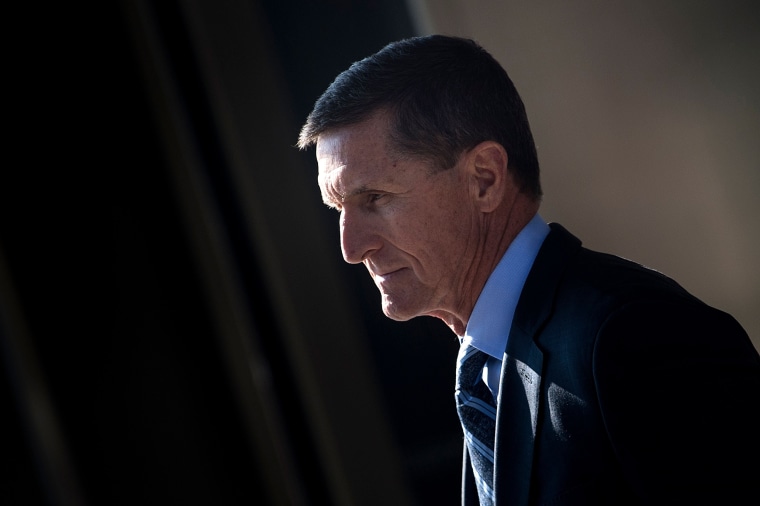
Trump fired Flynn after it became clear he had lied to the vice president about his conversations with Kislyak. A day later, by Comey's telling, Trump pulled the FBI director aside in the Oval Office and asked him to drop the investigation into Flynn.
Three months later Trump fired Comey, citing a memo by Deputy Attorney General Rod Rosenstein criticizing Comey's handling of the Hillary Clinton email investigation.
The sacking shocked official Washington, conjuring up images of 1973's Saturday Night Massacre, when Richard Nixon ordered the removal of the Watergate special prosecutor. The rule of law seemed under threat, and Rosenstein's reputation as a straight-shooting career civil servant was in danger.
Rosenstein, who was in charge of the Russian investigation in the wake of a recusal by Attorney General Jeff Sessions, was stung by intense criticism. He decided he had to act.
What he did next changed Donald Trump's presidency.
Without consulting the White House, Rosenstein announced the appointment of Robert Swan Mueller III as special counsel in charge of the Russia investigation.
While Mueller reported to the Justice Department, his status as a special counsel immediately transformed the Russia investigation.
He had a separate budget and was able to pick his own team of prosecutors and agents, some of whom left jobs with seven-figure salaries. Unlike other federal law enforcement officers, they had the luxury of devoting every waking hour to a single assignment.
Their mandate seemed to be narrow: To investigate how the Russians interfered with the 2016 election, including whether Trump or his associates conspired with Russia. But the instruction also allowed Mueller to look into any other matters that arose.
Soon enough, other matters did arise.
In June, based on interviews Mueller's team was conducting with Cabinet members and others, it became clear that the special counsel was investigating the question of whether Trump had obstructed justice.
If the president wasn't under investigation before, he was now.
In July, FBI agents raided Manafort's Alexandria, Virginia, apartment, a sign that they had amassed significant evidence against him.
In October, Manafort and the second-in-command at his political consultancy, Rick Gates, were indicted on a host of bank and tax fraud charges related to their work for Russian interests in Ukraine. It was clear to most legal observers that Mueller was throwing the book at the former Trump insiders in part to secure their cooperation. It would only be the beginning of their legal troubles.
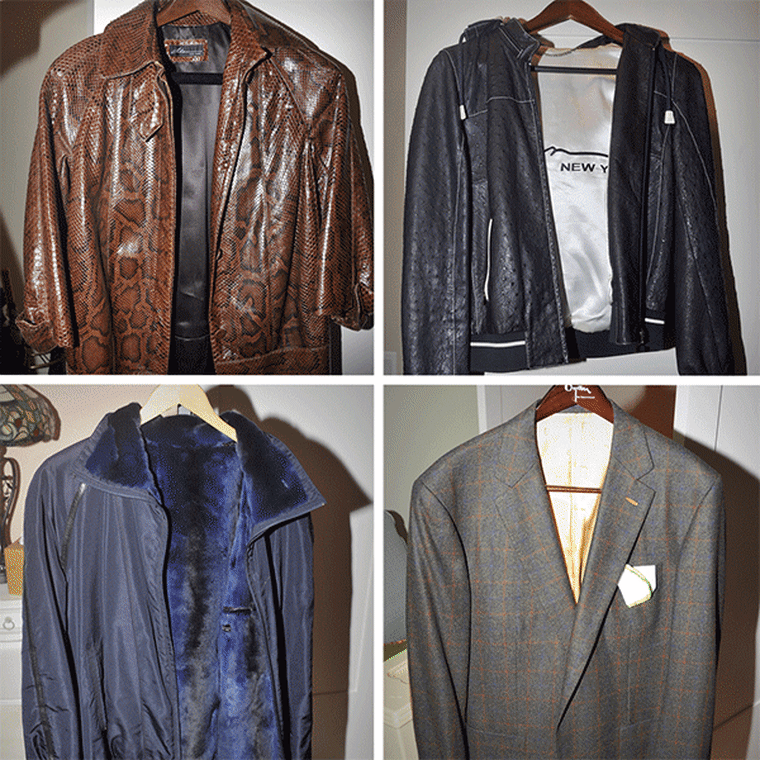
On the same day, Papadopoulos was charged with lying to the FBI about his contacts with the Maltese professor — a suspected Russian agent who told him about the Clinton emails.
That was the first indication that the Russians had broached the subject of hacked emails with a member of the Trump campaign. It remains unclear how far within the campaign that information traveled — another important unanswered question about Trump and Russia.
In December, Flynn pleaded guilty to lying to the FBI and agreed to cooperate with Mueller. Much of what he has told the special counsel — including why he lied about his conversations with the Russian ambassador — remains a mystery.
Mueller indicts Russians, flips Trump insiders
Having slapped the cuffs on some of Trump's closest aides, Mueller and his investigators had come to preoccupy not only a president quick to vent his anger on Twitter, but much of the news-consuming public. The investigation hovered over Washington like a mysterious alien spacecraft that occasionally hurled energy bolts to set the capital abuzz.
Mueller's team was believed not to leak, and the only thing his spokesman would tell reporters on background is that more than half of the news reports about the investigation were wrong.
Still, reports of witnesses being summoned to visit with Mueller prosecutors — or angles Mueller was said to be investigating became a staple of Washington journalism throughout 2018.
Interesting strands seem to surface and then fade from view. A meeting in the Seychelles, a reported subpoena to a German bank, allegations of foreign campaign contributions — no one outside of Mueller's team had any clear idea where these stories fit, if at all, in the investigation.
For his part, Mueller spoke only through court documents. In February and again in June, he spoke loudly and in great detail, releasing massive indictments against Russians that harnessed the fruits of secret U.S. intelligence collection to expose how the Russian government and their agents manipulated the American electorate.
The first indictment laid out how a former chef of Putin and his minions, operating out of a St. Petersburg office building, used American social media companies to spew propaganda and manipulate voters, mostly in the service of promoting Trump for president.
The second indictment, which named Russian intelligence officers, sketched a conspiracy to hack into the Democratic National Committee, steal thousands of emails and leak them in a way to cause maximum disruption to the Clinton campaign.
Both documents accused defendants of conspiring to defraud the United States, leaving open the possibility that any American found to have aided that conspiracy — whether he or she knew the full contours of it — could be charged with felonies.
On Aug. 21 came another turning point.
Manafort was convicted of eight counts of fraud and failure to disclose foreign bank accounts in his Virginia trial, one in which his former partner Gates, now a government cooperator, testified against him. He now faced many years in prison and another trial in Washington.
And just as the Manafort verdict was breaking, an even more consequential development was unfolding in New York.
Former Trump Organization lawyer Michael Cohen, who once said he would take a bullet for Trump, walked into a courtroom, pleaded guilty to felonies and implicated the president in a campaign finance crime over hush money payments to women.
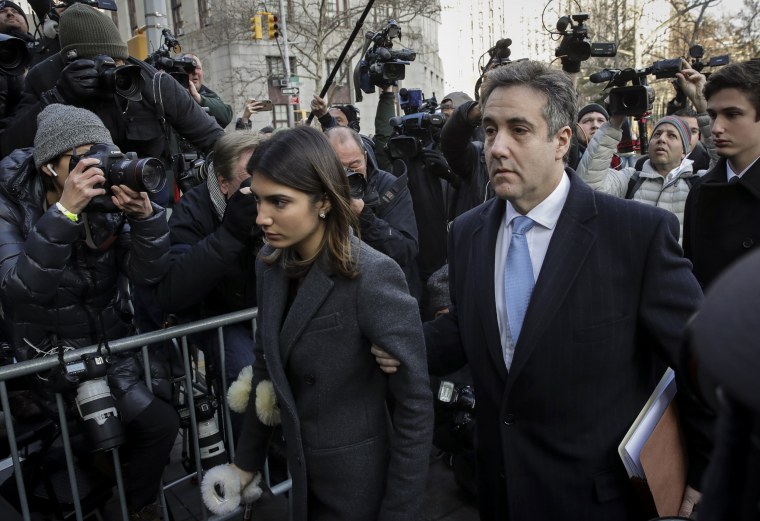
He didn't have a formal cooperation deal, but his lawyer said he would tell the truth about Trump to any prosecutor who asked. Mueller's team would take him up on it.
In September, on the eve of his second trial, Manafort agreed to cooperate with Mueller as well.
The special counsel had now flipped two people who knew the secrets of the Trump campaign — Gates had been deputy campaign chairman and knew the secrets of the Trump Organization.
As Justice Department guidelines dictate, Mueller went quiet in the weeks before the November election. Democrats won the House, insuring that they would be able to subpoena, among other things, the fruits of Mueller's work, should anyone try to bury it.
Endgame?
After the election, Mueller began speaking again through the courts on what seemed like a weekly basis.
The news was relentless.
Manafort's plea deal fell apart after Mueller accused him of lying, exposing him to a virtual life sentence and mystifying legal experts.
Cohen pleaded guilty to lying to Congress about a Trump Tower project in Moscow, in the process putting a spotlight on the president's untruths about contacts with Russians.
During his first news conference as president in February 2017, Trump was asked five times whether he or any of his aides were in touch with Russians during the campaign. He said he was aware of no such interactions.
But in the Cohen charging document, Mueller's team said Trump conferred with Cohen in November 2015 "about contacting the Russian government before reaching out to gauge Russia's interest" in a Trump-Putin meeting at the United Nations.
Trump did not explain the contradiction.
Flynn, who had been quiet for a year since he made a deal with Mueller, burst into public view again when Mueller filed a sentencing document praising his cooperation and calling for no prison time.
The most newsworthy thing about the filing was that half of it was blacked out, showing that Flynn had helped prosecutors with investigations that were still ongoing.
The public parts of the document did not answer the most fundamental questions about Flynn: Why did he lie about his conversations with the Russian ambassador? What did Trump know about that? Was he aware of any Trump campaign coordination with the Russians?
As for Cohen, Mueller made clear in a sentencing memo that he had been significantly helpful on the Russia questions at the core of his investigation — but he didn't reveal what Cohen had told him.
The other federal prosecutors dogging Cohen, from the Southern District of New York, were less satisfied. They said Cohen had refused to come clean about past criminal conduct.
But in their sentencing memo, they endorsed Cohen's claim that Trump had directed him to pay hush money to women who claimed they had sex with Trump, and that this was a felony under campaign finance law because it exceeded contribution limits and wasn't disclosed.
The federal prosecutors in New York announced that the parent company of the National Enquirer, which had been involved in one of the payments, also took the view that Trump had directed the hush money to help his campaign.
So as Cohen was sentenced to three years in prison, legal experts were chewing on the idea that the president had committed a felony — something Trump denies — and what that could mean for the future of his presidency.
Even Democrats, however, seemed to doubt that this single, complicated issue would lead to Trump's impeachment.
Yet NBC News reported that the New York prosecutors continued to investigate the matter, raising questions about how far into Trump's business dealings prosecutors would go.
Trump's lawyer, former New York Mayor Rudolph Giuliani, complained that prosecutors were poring through Trump's business records going back to 1982.
As 2018 drew to a close, the core Russia question — whether Trump or people around him conspired to allow a foreign power to influence the election — remained unanswered.
Also unknown was what, if anything, Mueller had learned about any financial entanglements between Trump and Russians — whether Putin had something, to be blunt, on the president of the United States.
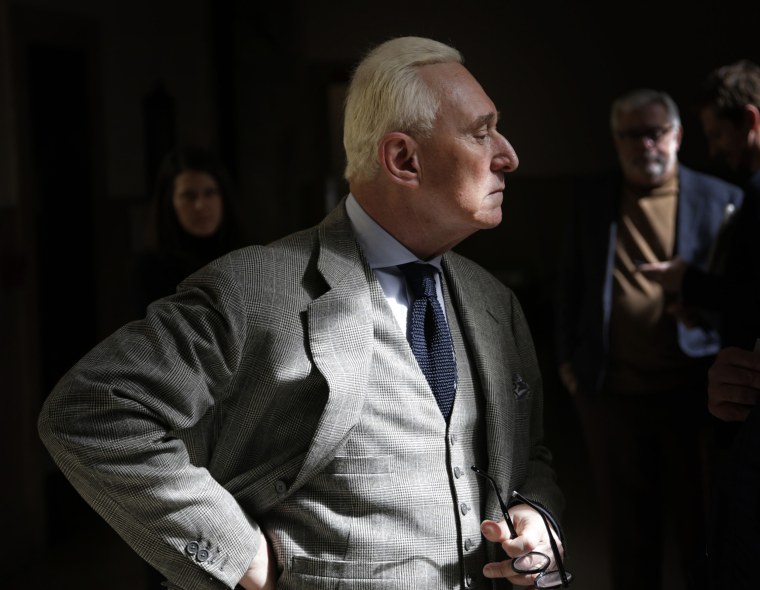
While Mueller appeared to be wrapping up, legal experts pointed to the unfinished business regarding two Trump associates, Jerome Corsi and Roger Stone. Both had said they expected to be indicted, and a draft plea agreement accused Corsi of knowing in advance that WikiLeaks had obtained hacked Democratic emails, and lying about it.
Also, the sentencing of cooperator Gates had been postponed, amid reports he was helping with a third federal criminal investigation into fundraising and spending by Trump's inaugural committee.
Expectations were high in Washington that when Mueller files his report, at least some portion of it would be made public.
But whatever that report finds, the incoming New York state attorney general has promised sweeping investigations of Trump and his family.
And House Democrats are gearing up to examine everything from Trump's involvement in decisions over a new FBI headquarters that could affect his Washington hotel to his son-in-law's security clearances.
Even if Mueller were to close up shop in early 2019, few believe it would spell the end of investigations into Donald Trump and those around him.
